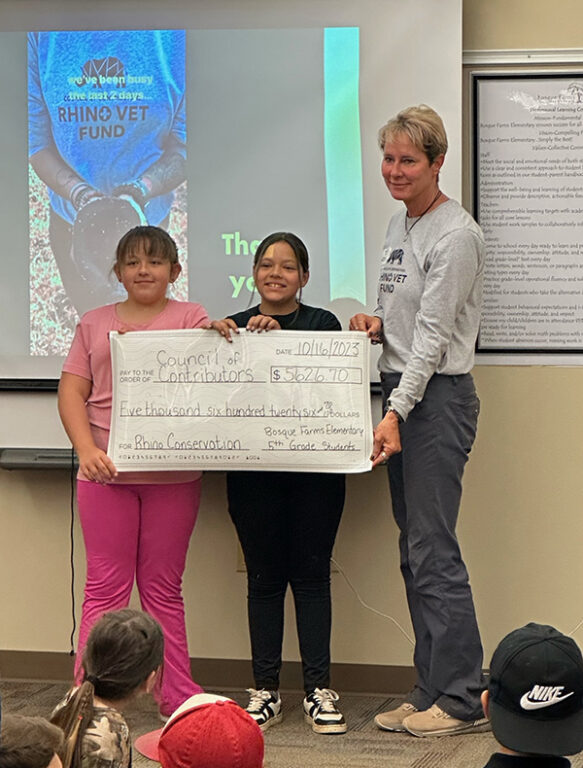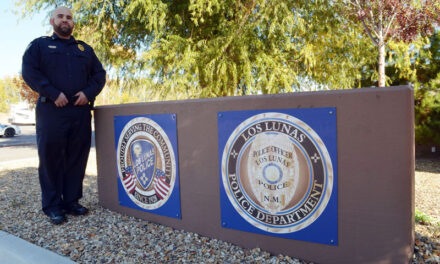BOSQUE FARMS — In a heartwarming display of compassion and dedication, the fifth-graders at Bosque Farms Elementary raised $5,626 to help save one of the Earth’s most wondrous animals — the rhinoceros.
In two days, the young philanthropists raised $626 for rhino conservation by selling Blow Pops during lunch, and a local charitable foundation added another $5,000 to the total.

Photos courtesy of Jennifer Blair
Bosque Farms Elementary fifth-grade students, Avery and Stormy Deubel, present Diana DeBlanc with a check of $5,626.70 to help with rhino conservation in Africa. All the fifth-grade classes raised the money by selling suckers.
The children in Jennifer Blair’s fifth-grade class became fascinated with rhinos after learning Diana DeBlanc, DVM, a local veterinarian, was coming to speak to the class about them.
“I always feel like it’s important for my kids to expand their scope beyond their school in their local community,” says Blair.
DeBlanc has gone to Africa to care for rhinos with nonprofit organizations every year since 2017. Originally, she volunteered with Care for Wild’s Rhino Sanctuary, but now she works with the Council of Contributors doing veterinarian work in Africa and leading groups to help with the conservation efforts.
Care for Wild is a conservation organization dedicated to preserving endangered species, and the Council of Contributors goal is to save the rhino from going extinct at the hands of poachers.
Blair’s sister, April Barrick, recently accompanied DeBlanc to a South African game reserve to help care for and de-horn rhinos. That’s what inspired Blair to have DeBlanc speak to her class about rhino conservation.
The students researched as much as they could so they could knowledgeably listen and take part in DeBlanc’s presentation. In their research, the fifth-graders learned about the dire situation rhinos are in worldwide.
“The kids were so sad that the rhinos were going away and that they might never have an opportunity to see one when the numbers were diminishing so quickly, so they were really enthusiastic about learning as much as they could,” said Blair.
Blair decided to have a fundraiser so when DeBlanc came for the presentation the class could contribute to the conservation cause and she got the other two fifth-grade classes to join in the fundraising efforts.
The classes sold suckers for two days during the lunch periods. Blair said on the first day, they made about $150. The students were more proactive on the second day, they sent out a reminder and, during the morning announcements, they gave rhino facts to the school.
The fundraiser exceeded expectations, with about 1,100 lollipops sold within just two days. When they were done counting the money it was more than $600. Blair said the children cheered and were so excited they had raised that much money.
Prior to the fundraising, the Lineberry Foundation pledged to match the children’s contributions fivefold, ultimately donating $5,000.
The Lineberry Foundation is a private grant-making organization dedicated to supporting charitable groups in New Mexico. They prioritize grants with transformative impacts in the areas of environment, arts and culture, health, visually impaired services, animal welfare and helping the less fortunate.
The children and the teachers kept the amount they were going to present to DeBlanc a secret. All she knew was the students were doing a fundraiser.
“I broke into tears,” says DeBlanc. “It was such a dear moment. I get chills right now thinking about it and it was such a sweet thing.”
DeBlanc says the donation will go directly to help on the frontlines. A portion of the money will go to the pilot for anti-poaching efforts, some will help fund the dehorning and some will go to help injured rhinos.
Rhinos are in the eleventh-hour
According to the Council of Contributors website, a rhino is killed for its horn every day, with rhino horns fetching $30,000 per kilogram on the black market.
That makes rhino horns more valuable than gold or diamonds on the black market and, according to the Associated Press, South Africa has the highest unemployment rate in the world at 33 percent.

Photos courtesy of Jennifer Blair
Diana DeBlanc, DVM, a local veterinarian, has gone to Africa since 2017 to care for rhinos with nonprofit organizations.
For someone making dollars a day to get offered a couple grand to go kill a rhino for the horn, DeBlanc says, “Of course, they’re gonna do it. It’s more money than their villages have seen in a year and for what? For a quick bullet, you know for really a five-minute job.”
In an effort to save the animals from being eradicated, DeBlanc and the Council of Contributors are on a mission to safely remove rhino horns, thereby eliminating the incentive for poachers to target them.
If the current trend keeps pace, rhinos in the wild will go extinct in 15 years.
If you are interested in donating to the Council of Contributors, visit councilofcontributors.com/contribute or you can contact DeBlanc directly through her website at dianadeblanc.org.
Jesse Jones lives in Albuquerque with his wife and son. Jesse graduated from of the University of New Mexico twice. This spring, he graduated with a degree in multimedia journalism and, in 2006, he received a bachelor’s degree in university studies with an emphasis in photojournalism. He is a current fellow of the New Mexico Local News Fund.

















